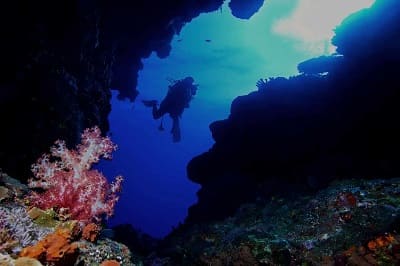Home › A-Z Scuba › Common Diving Injuries › Nitrogen Narcosis
Narcosis Symptoms and Treatment
When breathed under pressure, such as when scuba diving deeper than thirty (30) metres (100 feet), nitrogen has an intoxicating effect.
This guide lists all the common symptoms of nitrogen narcosis, a simple way to reverse the euphoric hallucinations underwater, and how to avoid narcosis while diving.
How to Treat Nitrogen Narcosis Symptoms?
First, let's clarify a few basic facts about nitrogen narcosis, also called:
- Being narc'd (a diver slang word)
- Depth intoxication
- Inert gas narcosis (e.g. argon, hydrogen, neon)
- Martini's law (one cocktail for every 10 metres dived below 20 metres)
- Raptures of the deep (l'ivresse des grandes profondeurs)
Changes in neuromuscular activity and consciousness can occur when divers breathe a compressed inert gas at depth, such as nitrogen (N).
Typical manifestations appear during a deep scuba dive, usually below thirty metres (100 ft.). Even so, there have been documented cases of divers suffering narcotic reactions even in shallow water.
In other words, the risk of experiencing euphoria or hallucinations will increase 'somewhat exponentially' as divers go deeper. But, a spontaneous reversal occurs (within minutes) as soon as a diver starts ascending to a shallower depth.
Pro Tip: Beginners may get confused about the effects of nitrogen narcosis vs. decompression sickness (known as the bends in scuba diving). But, they are not the same condition and DCS is potentially a lot more serious.
What Causes Nitrogen Narcosis?
The best way to explain the actual cause of narcosis is to use Henry's law: "The amount of dissolved gas in a liquid is directly proportional to its partial pressure above the liquid."
In simple terms, a consequence of the elevated pressures can result in an increase of gas solubility for human cells and body tissues.
There are certain known factors that tend to increase the likelihood for scuba divers (including freedivers) to suffer some, or several, symptoms of nitrogen narcosis, such as:
- Anxiety, apprehension, or inexperience
- Alcohol intoxication (including medication and sedative drugs)
- Diving in:
- Cold water (e.g. effects of hypothermia)
- Deep, dark water
- Low visibility (e.g. night diving)
- Fatigue or heavy work
- Medical history for being susceptible
- Retention of carbon dioxide (hypercapnia)
 Nitrogen Narcosis Symptoms
Nitrogen Narcosis Symptoms
- Anxiety or pessimism
- Depression
- Drowsiness
- Drunkenness (a feeling of 'narced' intoxication)
- Dysfunction
- Giddiness
- Hallucinations
- Idea fixation (irrational ideology)
- Ignorance towards hazardous marine life injury
- Impairment of:
- Attention
- Concentration
- Decision-making
- Judgement
- Memory
- Reasoning
- Loss of body heat
- Loss of coordination
- Mood swing (e.g. fear, insecurity, and paranoia or overconfidence, tranquillity, and euphoria)
- Sense of well-being, light-headedness, vertigo
- Poor cognition and neuromuscular function
- Unconsciousness (death at extreme depths beyond 120 metres (400 feet))
Nitrogen Narcosis Treatment
In fact, prevention is the best treatment for nitrogen narcosis. But, you can avoid most of the worst symptoms by limiting your depth of submersion and using safe gas mixes.
In addition, using the scuba diver buddy system is a way for other divers to recognise the syndrome and end the dive without delay. Narcosis treatment may involve:
- Protecting the victim from a diving injury until the ascent is sufficient to eliminate the narcotic effects.
- Checking to see if the signs and symptoms persist after making an ascent to the surface. If so, the cause will not be narcosis and you should seek a medical evaluation.
In most cases, nitrogen narcosis is not fatal. But, its effects can lead to some of the common diving injuries (e.g. decompression sickness).
Related Information and Help Guides
- Accidents in Scuba Diving: Reports and Case Studies
- Decompression Illness Signs, Symptoms, and Treatment
- List of Diving Injuries Explained for Beginners
- Nitrogen Narcosis Symptoms PDF Download
- Scuba Deaths Statistics Per Year (Latest DAN Report)
- What is The Bends Underwater Scuba Diving Hazard?
Important: The tutorial video [16:21 seconds] presented by DAN explains how gas toxicities and pressure affect the human body during a dive.